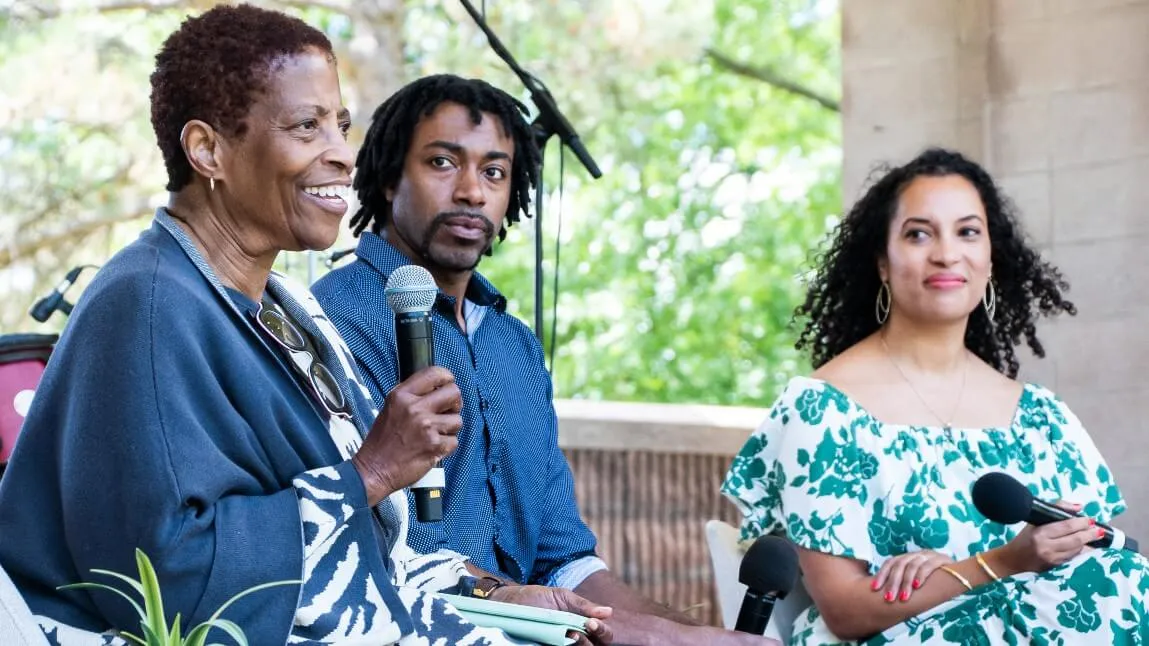“Many BIPOC (Black, Indigenous, and people of color) individuals distrust healthcare, and the healthcare system. They feel as though they're not listened to, and maybe don't feel comfortable talking to or being treated by healthcare providers,” said Dean Noma Anderson in a public discussion with family medicine physician Anthony Williams, psychologist Marissa Coleman, and nurse manager Oscar Omuonya during the UVM Health Network’s Black Health Panel in Burlington's Battery Park on June 19.
The opportunity to reduce health disparities by increasing the number of BIPOC and African American students pursuing careers in healthcare fields is at the forefront of Anderson’s mind as she reviews her first year as dean of the College of Nursing and Health Sciences.
“What we realize is that BIPOC patients have better results when they are treated by BIPOC health care providers,” said Anderson, emphasizing the range of career opportunities with differing educational requirements – from one- and two-year programs to four-year or master’s degrees to advanced training in medicine, pharmacy, or dentistry - before calling attention to the challenges for minorities who pursue higher education.
“While one of the truths is that there are many ways to enter the healthcare field, educationally, the road is not a level one. And it's not an easy one to access,” said Anderson, pointing to the continued devastating impacts of systemic racism and academic disparity in higher education.
“When we think about public school education: schools receive funding based upon their tax base. If you live in a community that is economically depressed, the tax base is depressed, and the schools are depressed. When you look at where the most prestigious public schools are, they're in communities where there is a higher tax. And so, when we look at the pathways, essentials to enter higher education, regardless of if it's healthcare, or any discipline, we have to look at the very beginning of the educational journey, and it is uneven. And it is discriminatory, and it is unfair,” said Anderson.
“While I'm encouraging more BIPOC students to enter healthcare, it should be told it's not the easiest of journeys to partake. Students need encouragement. They need mentoring. They need support, and they need resilience because it is wonderful when they succeed,” she said.
As Dean, bridging gaps to success for all students is top of mind for Anderson. Since joining the College in February 2021, Anderson has strengthened College operations, created the Associate Dean for Faculty Affairs and Research role, and hired the first Coordinator of Diversity, Equity, and Inclusion for CNHS, while striving to provide a sense of continuity and continuation of leadership during COVID-19. She’s leading the development of a new strategic plan, expanding the CNHS research agenda, and looking for ways to enhance the student experience while ensuring graduates are well-prepared to enter their fields. Anderson envisions the College of Nursing and Health Sciences as a model for supporting the health and wellbeing of students, faculty, and staff - and also as an example of equity in action.
“I want everyone to feel as though they have a role in the college, and they have equity of voice and democracy of voice. I want our college to contribute to the health and wellbeing of our constituents, and to be instrumental in this role for the campus to the extent that we can. We're well on our way to that.”
“We have wonderful leadership. We have wonderful faculty and staff,” said Anderson. “I want us to be the program of choice and the college of choice for individuals - a top choice for students in the disciplines in which they're interested.”
Day in the Life of a Dean
A typical workday for Anderson involves multiple meetings and conversations. She spends her time looking at what's happening in the university at large, touching base with administrators, and making sure the College is on task with what it needs to do. She regularly meets with the academic health sciences team, the UVM Health Network and UVM Medical Center boards, and the governance board of the Clinical Simulation Center.
Some of Anderson's favorite moments this year included commencement (“it was just so exciting to see the parents and the families and the joy of the students”); the fall College kickoff meeting, her first opportunity to meet many CNHS faculty and staff in person; and the Zeigler Forum showcasing student and faculty research.
When she’s not working, Anderson is an active member of her church. She loves to read and listens to audiobooks during her daily commute. (Fun fact: she still meets virtually with her book club in Memphis, where she lived before moving to Vermont). She enjoys going to movies by herself. And before or after work, depending on her schedule, she likes to work out at the YMCA.
